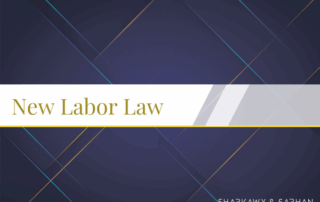11th of April, 2018
New Amendments to the Capital Market Law
Keywords: Financial Institutions, Banking & Finance
New Amendments to the Capital Market Law
One of the most extensive amendments yet made to the Capital Markets Law (the “CM Law”) was issued on 14 March 2017. The Capital Markets Law new amendment (the “CM Law Amendment”) marks the culmination of an extremely rapid legislative process in Egypt. The CM Law Amendment is introducing and amending a wide range of provisions, which we will highlight most of them in this update.
We believe there are 9 main takeaways, which you’ll find them discussed below in details.
1. Cancelling Bearer Shares:
To enhance Egypt’s international rating in relation to Anti Money Laundry, the CM Law Amendment now prohibits the issuance of bearer-shares. Further obliging companies that previously issued bearer-shares to cancel these shares and replace them with nominal shares before 13 March 2019 according to the regulations and procedures to be issued by the FRA.
2. Suspension of EGX Traders:
The CM Law Amendment introduced a new administrative penalty to be imposed directly by FRA Chairman and/or EGX Chairman without the need to obtain a court judgement. FRA Chairman and/or EGX Chairman has the right to stop any trader from purchasing securities from the Egyptian stock exchange (whether such trader is acting in its name and on its behalf or for another beneficiary owner), if the trader committed any breach in relation to price manipulation or any other breach of the CM Law. Suspension should be issued by virtue of a reasoned decree based on investigations being conducted by the FRA/EGX and for a period not exceeding six months.
3. Increase in Fines and Its Scope of Application:
There is a general tendency towards increasing fines and the scope of its application in the CM Law Amendment.
- The CM Law Amendment extended the scope of breaches under article 63 of the CM Law to include, amongst others, the following breaches:
wilfully breaching representations in relation to minority shareholders’ rights or sukuk holders’ rights;
wilfully breaching FRA’s criteria for financial evaluation;
issuing or offering sukuk for trading in contrary to the CM Law; and
undertaking fraudulent evaluation of assets.
- Instead of having the usual minimum and maximum thresholds for fines under the CM Law, the CM Law Amendment introduced an additional benchmarking to the amount of (i) gained revenues; or (ii) avoided losses.
-
- Accordingly, minimum thresholds on certain fines are now pegged to either: (i) the minimum thresholds set out in the law; or the amount of revenues gained or losses avoided by the violator, whichever is higher. Similarly, the caps on certain fines are now pegged to either: (i) the minimum thresholds set out in the law; or double the amount of revenues gained or losses avoided by the violator, whichever is higher. Depending on the circumstances of the violation, this can result in significant and rather unpredictable financial liability for certain violations depending on the assessment of the revenues gained or losses avoided.
- The CM Law Amendment further introduced the following specific penalty for acquiring shares and/or securities, in breach of the MTO rules:
a fine of not less than EGP 100,000 and not exceeding EGP 500,000;.
the defaulting party cannot settle/reconcile with FRA unless the defaulting party (i) presents a compliant MTO with respect to the shares and/or securities in question; and (ii) pays settlement payment to FRA of not less than 1% of the value of the relevant shares and/or securities subject matter of the violation and not exceeding 10% of the value of such shares and/or securities.
The CM Law Amendment increased the cap for disposing securities or financial instruments in breach of the CM Law to be EGP 100,000 instead of EGP 10,000.
4. Liability of CEOs, Bane Now Relieved?
The CM Law Amendment introduced some limitations on the liability of directors responsible for actual management (CEOs and executives) for the company’s breach of the CM Law. This was a major concern as the CM Law imposed such liability in absolute. Now directors responsible for actual management (CEOs and executives) are liable only to the extent that (i) they had actual knowledge of the breach; and (ii) the breach was a result of their failure to perform their managerial duties.
5. Easier Procedures for Issuing Short-term Debt Securities:
In a step to facilitate and encourage short-term debt instruments, issuing short-term debt securities or Sukuk of maturity date not exceeding 2 years could be through a BOD resolution instead of a general meeting (GM) resolution provided that (i) the BOD is authorized by a GM or an authorized entity; and (ii) issuance will be according to FRA’s regulations and procedures.
6. Dual Listing:
The CM Law Amendment now adheres to current practice and the listing rules by allowing dual listing provided that FRA’s approval is obtained.
7. Are We Moving Towards Electronic Publication of Prospectus?
The CM Law Amendment removed the explicit requirement of publishing prospectus, semi-annual reports, annual FS and summary of any substantial events that affects the activities or financial status of a listed company or a company that offered its shares to the public in two widely spread newspapers. Further referring to FRA’s board of directors (BOD) to issue the publication requirements. We hope this would pave the way for FRA to introduce electronic publications, especially that the original proposed amendments included electronic publications on FRA’s website.
8. Are There Any Changes in DisclosureYES Obligations?
The CM Law Amendment removed pre-acquisition disclosures with respect to substantial acquisitions in listed companies or companies which have offered its shares to the public and instead refers to the ER for regulating all aspects of acquisitions and purchase offers including disclosures. Unless the ER is amended to re-introduce the pre-acquisition disclosures, such amendment may be a step towards cancelling the pre-acquisition disclosure required when (i) a shareholder intends to make an acquisition that would result in owning shares amounting in aggregate to more than 10% of the issued nominal share capital of an issuer, or (ii) a BOD or an employee intends to make an acquisition that would result in owning shares amounting in aggregate to more than 5% of the issued nominal share capital of an issuer.
9. New Opportunities for Capital Markets’ Companies!
a) Exchange Companies:
An Exchange Company is a company established for trading in one or more securities such as trading in future contracts. The CM Law Amendment allows for the establishment of Exchange Companies after obtaining FRA’s approval, while the old law and the current ER requires the approval of the relevant minister. We expect that the ER would be amended to comply with the CM Law Amendment. Such change in the required approval paves the way for more simple procedures of establishment and licensing, similar to other capital markets’ companies licensed and regulated by FRA.
The CM Law Amendment restricts the establishment of Exchange Companies to JSCs, which is a natural requirement for Capital Markets companies.
According to the CM Law Amendment, the FRA would have very broad authorities over Exchange Companies such as the authority to prevent the company from undertaking its activities, removing its BOD and appointing a representative to manage the company or obliging the company to increase its insurance with FRA.
b) Subscription in Investment Funds:
The CM Law Amendment explicitly allows licensed companies to receive subscriptions in fund certificates, which was an activity monopolized by banks.
c) Undertaking Fund’s Activities:
The CM Law Amendment allows licensed companies undertaking non-banking activities, as determined by a decree to be issued by FRA, to undertake Investment Funds activities, while the old provisions of the CM Law restricted this activity to banks and licensed insurance companies.
d) Sukuk:
Are you an Egyptian company looking to expand your operations (the “Borrower”), an International Financial Institution (IFI) or an investor looking to invest in Egypt, a Capital Markets’ Group looking for new opportunities? If YES , then we prepared this tutorial especially for you!
1. Cancelling Bearer Shares:
To enhance Egypt’s international rating in relation to Anti Money Laundry, the CM Law Amendment now prohibits the issuance of bearer-shares. Further obliging companies that previously issued bearer-shares to cancel these shares and replace them with nominal shares before 13 March 2019 according to the regulations and procedures to be issued by the FRA.
2. Suspension of EGX Traders:
The CM Law Amendment introduced a new administrative penalty to be imposed directly by FRA Chairman and/or EGX Chairman without the need to obtain a court judgement. FRA Chairman and/or EGX Chairman has the right to stop any trader from purchasing securities from the Egyptian stock exchange (whether such trader is acting in its name and on its behalf or for another beneficiary owner), if the trader committed any breach in relation to price manipulation or any other breach of the CM Law. Suspension should be issued by virtue of a reasoned decree based on investigations being conducted by the FRA/EGX and for a period not exceeding six months.
3. Increase in Fines and Its Scope of Application:
There is a general tendency towards increasing fines and the scope of its application in the CM Law Amendment.
- The CM Law Amendment extended the scope of breaches under article 63 of the CM Law to include, amongst others, the following breaches:
wilfully breaching representations in relation to minority shareholders’ rights or sukuk holders’ rights;
wilfully breaching FRA’s criteria for financial evaluation;
issuing or offering sukuk for trading in contrary to the CM Law; and
undertaking fraudulent evaluation of assets.
- Instead of having the usual minimum and maximum thresholds for fines under the CM Law, the CM Law Amendment introduced an additional benchmarking to the amount of (i) gained revenues; or (ii) avoided losses.
- Accordingly, minimum thresholds on certain fines are now pegged to either: (i) the minimum thresholds set out in the law; or the amount of revenues gained or losses avoided by the violator, whichever is higher. Similarly, the caps on certain fines are now pegged to either: (i) the minimum thresholds set out in the law; or double the amount of revenues gained or losses avoided by the violator, whichever is higher. Depending on the circumstances of the violation, this can result in significant and rather unpredictable financial liability for certain violations depending on the assessment of the revenues gained or losses avoided.
- The CM Law Amendment further introduced the following specific penalty for acquiring shares and/or securities, in breach of the MTO rules:
a fine of not less than EGP 100,000 and not exceeding EGP 500,000;.
the defaulting party cannot settle/reconcile with FRA unless the defaulting party (i) presents a compliant MTO with respect to the shares and/or securities in question; and (ii) pays settlement payment to FRA of not less than 1% of the value of the relevant shares and/or securities subject matter of the violation and not exceeding 10% of the value of such shares and/or securities.
The CM Law Amendment increased the cap for disposing securities or financial instruments in breach of the CM Law to be EGP 100,000 instead of EGP 10,000.
4. Liability of CEOs, Bane Now Relieved?
The CM Law Amendment introduced some limitations on the liability of directors responsible for actual management (CEOs and executives) for the company’s breach of the CM Law. This was a major concern as the CM Law imposed such liability in absolute. Now directors responsible for actual management (CEOs and executives) are liable only to the extent that (i) they had actual knowledge of the breach; and (ii) the breach was a result of their failure to perform their managerial duties.
5. Easier Procedures for Issuing Short-term Debt Securities:
In a step to facilitate and encourage short-term debt instruments, issuing short-term debt securities or Sukuk of maturity date not exceeding 2 years could be through a BOD resolution instead of a general meeting (GM) resolution provided that (i) the BOD is authorized by a GM or an authorized entity; and (ii) issuance will be according to FRA’s regulations and procedures.
6. Dual Listing:
The CM Law Amendment now adheres to current practice and the listing rules by allowing dual listing provided that FRA’s approval is obtained.
7. Are We Moving Towards Electronic Publication of Prospectus?
The CM Law Amendment removed the explicit requirement of publishing prospectus, semi-annual reports, annual FS and summary of any substantial events that affects the activities or financial status of a listed company or a company that offered its shares to the public in two widely spread newspapers. Further referring to FRA’s board of directors (BOD) to issue the publication requirements. We hope this would pave the way for FRA to introduce electronic publications, especially that the original proposed amendments included electronic publications on FRA’s website.
8. Are There Any Changes in DisclosureYES Obligations?
The CM Law Amendment removed pre-acquisition disclosures with respect to substantial acquisitions in listed companies or companies which have offered its shares to the public and instead refers to the ER for regulating all aspects of acquisitions and purchase offers including disclosures. Unless the ER is amended to re-introduce the pre-acquisition disclosures, such amendment may be a step towards cancelling the pre-acquisition disclosure required when (i) a shareholder intends to make an acquisition that would result in owning shares amounting in aggregate to more than 10% of the issued nominal share capital of an issuer, or (ii) a BOD or an employee intends to make an acquisition that would result in owning shares amounting in aggregate to more than 5% of the issued nominal share capital of an issuer.
9. New Opportunities for Capital Markets’ Companies!
a) Exchange Companies:
An Exchange Company is a company established for trading in one or more securities such as trading in future contracts. The CM Law Amendment allows for the establishment of Exchange Companies after obtaining FRA’s approval, while the old law and the current ER requires the approval of the relevant minister. We expect that the ER would be amended to comply with the CM Law Amendment. Such change in the required approval paves the way for more simple procedures of establishment and licensing, similar to other capital markets’ companies licensed and regulated by FRA.
The CM Law Amendment restricts the establishment of Exchange Companies to JSCs, which is a natural requirement for Capital Markets companies.
According to the CM Law Amendment, the FRA would have very broad authorities over Exchange Companies such as the authority to prevent the company from undertaking its activities, removing its BOD and appointing a representative to manage the company or obliging the company to increase its insurance with FRA.
b) Subscription in Investment Funds:
The CM Law Amendment explicitly allows licensed companies to receive subscriptions in fund certificates, which was an activity monopolized by banks.
c) Undertaking Fund’s Activities:
The CM Law Amendment allows licensed companies undertaking non-banking activities, as determined by a decree to be issued by FRA, to undertake Investment Funds activities, while the old provisions of the CM Law restricted this activity to banks and licensed insurance companies.
d) Sukuk:
Are you an Egyptian company looking to expand your operations (the “Borrower”), an International Financial Institution (IFI) or an investor looking to invest in Egypt, a Capital Markets’ Group looking for new opportunities? If YES , then we prepared this tutorial especially for you!

New Amendments to the Capital Market Law
11th of April, 2018
Keywords: Financial Institutions, Banking & Finance
New Amendments to the Capital Market Law
One of the most extensive amendments yet made to the Capital Markets Law (the “CM Law”) was issued on 14 March 2017. The Capital Markets Law new amendment (the “CM Law Amendment”) marks the culmination of an extremely rapid legislative process in Egypt. The CM Law Amendment is introducing and amending a wide range of provisions, which we will highlight most of them in this update.
We believe there are 9 main takeaways, which you’ll find them discussed below in details.
1. Cancelling Bearer Shares:
To enhance Egypt’s international rating in relation to Anti Money Laundry, the CM Law Amendment now prohibits the issuance of bearer-shares. Further obliging companies that previously issued bearer-shares to cancel these shares and replace them with nominal shares before 13 March 2019 according to the regulations and procedures to be issued by the FRA.
2. Suspension of EGX Traders:
The CM Law Amendment introduced a new administrative penalty to be imposed directly by FRA Chairman and/or EGX Chairman without the need to obtain a court judgement. FRA Chairman and/or EGX Chairman has the right to stop any trader from purchasing securities from the Egyptian stock exchange (whether such trader is acting in its name and on its behalf or for another beneficiary owner), if the trader committed any breach in relation to price manipulation or any other breach of the CM Law. Suspension should be issued by virtue of a reasoned decree based on investigations being conducted by the FRA/EGX and for a period not exceeding six months.
3. Increase in Fines and Its Scope of Application:
There is a general tendency towards increasing fines and the scope of its application in the CM Law Amendment.
- The CM Law Amendment extended the scope of breaches under article 63 of the CM Law to include, amongst others, the following breaches:
wilfully breaching representations in relation to minority shareholders’ rights or sukuk holders’ rights;
wilfully breaching FRA’s criteria for financial evaluation;
issuing or offering sukuk for trading in contrary to the CM Law; and
undertaking fraudulent evaluation of assets.
- Instead of having the usual minimum and maximum thresholds for fines under the CM Law, the CM Law Amendment introduced an additional benchmarking to the amount of (i) gained revenues; or (ii) avoided losses.
-
- Accordingly, minimum thresholds on certain fines are now pegged to either: (i) the minimum thresholds set out in the law; or the amount of revenues gained or losses avoided by the violator, whichever is higher. Similarly, the caps on certain fines are now pegged to either: (i) the minimum thresholds set out in the law; or double the amount of revenues gained or losses avoided by the violator, whichever is higher. Depending on the circumstances of the violation, this can result in significant and rather unpredictable financial liability for certain violations depending on the assessment of the revenues gained or losses avoided.
- The CM Law Amendment further introduced the following specific penalty for acquiring shares and/or securities, in breach of the MTO rules:
a fine of not less than EGP 100,000 and not exceeding EGP 500,000;.
the defaulting party cannot settle/reconcile with FRA unless the defaulting party (i) presents a compliant MTO with respect to the shares and/or securities in question; and (ii) pays settlement payment to FRA of not less than 1% of the value of the relevant shares and/or securities subject matter of the violation and not exceeding 10% of the value of such shares and/or securities.
The CM Law Amendment increased the cap for disposing securities or financial instruments in breach of the CM Law to be EGP 100,000 instead of EGP 10,000.
4. Liability of CEOs, Bane Now Relieved?
The CM Law Amendment introduced some limitations on the liability of directors responsible for actual management (CEOs and executives) for the company’s breach of the CM Law. This was a major concern as the CM Law imposed such liability in absolute. Now directors responsible for actual management (CEOs and executives) are liable only to the extent that (i) they had actual knowledge of the breach; and (ii) the breach was a result of their failure to perform their managerial duties.
5. Easier Procedures for Issuing Short-term Debt Securities:
In a step to facilitate and encourage short-term debt instruments, issuing short-term debt securities or Sukuk of maturity date not exceeding 2 years could be through a BOD resolution instead of a general meeting (GM) resolution provided that (i) the BOD is authorized by a GM or an authorized entity; and (ii) issuance will be according to FRA’s regulations and procedures.
6. Dual Listing:
The CM Law Amendment now adheres to current practice and the listing rules by allowing dual listing provided that FRA’s approval is obtained.
7. Are We Moving Towards Electronic Publication of Prospectus?
The CM Law Amendment removed the explicit requirement of publishing prospectus, semi-annual reports, annual FS and summary of any substantial events that affects the activities or financial status of a listed company or a company that offered its shares to the public in two widely spread newspapers. Further referring to FRA’s board of directors (BOD) to issue the publication requirements. We hope this would pave the way for FRA to introduce electronic publications, especially that the original proposed amendments included electronic publications on FRA’s website.
8. Are There Any Changes in DisclosureYES Obligations?
The CM Law Amendment removed pre-acquisition disclosures with respect to substantial acquisitions in listed companies or companies which have offered its shares to the public and instead refers to the ER for regulating all aspects of acquisitions and purchase offers including disclosures. Unless the ER is amended to re-introduce the pre-acquisition disclosures, such amendment may be a step towards cancelling the pre-acquisition disclosure required when (i) a shareholder intends to make an acquisition that would result in owning shares amounting in aggregate to more than 10% of the issued nominal share capital of an issuer, or (ii) a BOD or an employee intends to make an acquisition that would result in owning shares amounting in aggregate to more than 5% of the issued nominal share capital of an issuer.
9. New Opportunities for Capital Markets’ Companies!
a) Exchange Companies:
An Exchange Company is a company established for trading in one or more securities such as trading in future contracts. The CM Law Amendment allows for the establishment of Exchange Companies after obtaining FRA’s approval, while the old law and the current ER requires the approval of the relevant minister. We expect that the ER would be amended to comply with the CM Law Amendment. Such change in the required approval paves the way for more simple procedures of establishment and licensing, similar to other capital markets’ companies licensed and regulated by FRA.
The CM Law Amendment restricts the establishment of Exchange Companies to JSCs, which is a natural requirement for Capital Markets companies.
According to the CM Law Amendment, the FRA would have very broad authorities over Exchange Companies such as the authority to prevent the company from undertaking its activities, removing its BOD and appointing a representative to manage the company or obliging the company to increase its insurance with FRA.
b) Subscription in Investment Funds:
The CM Law Amendment explicitly allows licensed companies to receive subscriptions in fund certificates, which was an activity monopolized by banks.
c) Undertaking Fund’s Activities:
The CM Law Amendment allows licensed companies undertaking non-banking activities, as determined by a decree to be issued by FRA, to undertake Investment Funds activities, while the old provisions of the CM Law restricted this activity to banks and licensed insurance companies.
d) Sukuk:
Are you an Egyptian company looking to expand your operations (the “Borrower”), an International Financial Institution (IFI) or an investor looking to invest in Egypt, a Capital Markets’ Group looking for new opportunities? If YES , then we prepared this tutorial especially for you!
1. Cancelling Bearer Shares:
To enhance Egypt’s international rating in relation to Anti Money Laundry, the CM Law Amendment now prohibits the issuance of bearer-shares. Further obliging companies that previously issued bearer-shares to cancel these shares and replace them with nominal shares before 13 March 2019 according to the regulations and procedures to be issued by the FRA.
2. Suspension of EGX Traders:
The CM Law Amendment introduced a new administrative penalty to be imposed directly by FRA Chairman and/or EGX Chairman without the need to obtain a court judgement. FRA Chairman and/or EGX Chairman has the right to stop any trader from purchasing securities from the Egyptian stock exchange (whether such trader is acting in its name and on its behalf or for another beneficiary owner), if the trader committed any breach in relation to price manipulation or any other breach of the CM Law. Suspension should be issued by virtue of a reasoned decree based on investigations being conducted by the FRA/EGX and for a period not exceeding six months.
3. Increase in Fines and Its Scope of Application:
There is a general tendency towards increasing fines and the scope of its application in the CM Law Amendment.
- The CM Law Amendment extended the scope of breaches under article 63 of the CM Law to include, amongst others, the following breaches:
wilfully breaching representations in relation to minority shareholders’ rights or sukuk holders’ rights;
wilfully breaching FRA’s criteria for financial evaluation;
issuing or offering sukuk for trading in contrary to the CM Law; and
undertaking fraudulent evaluation of assets.
- Instead of having the usual minimum and maximum thresholds for fines under the CM Law, the CM Law Amendment introduced an additional benchmarking to the amount of (i) gained revenues; or (ii) avoided losses.
- Accordingly, minimum thresholds on certain fines are now pegged to either: (i) the minimum thresholds set out in the law; or the amount of revenues gained or losses avoided by the violator, whichever is higher. Similarly, the caps on certain fines are now pegged to either: (i) the minimum thresholds set out in the law; or double the amount of revenues gained or losses avoided by the violator, whichever is higher. Depending on the circumstances of the violation, this can result in significant and rather unpredictable financial liability for certain violations depending on the assessment of the revenues gained or losses avoided.
- The CM Law Amendment further introduced the following specific penalty for acquiring shares and/or securities, in breach of the MTO rules:
a fine of not less than EGP 100,000 and not exceeding EGP 500,000;.
the defaulting party cannot settle/reconcile with FRA unless the defaulting party (i) presents a compliant MTO with respect to the shares and/or securities in question; and (ii) pays settlement payment to FRA of not less than 1% of the value of the relevant shares and/or securities subject matter of the violation and not exceeding 10% of the value of such shares and/or securities.
The CM Law Amendment increased the cap for disposing securities or financial instruments in breach of the CM Law to be EGP 100,000 instead of EGP 10,000.
4. Liability of CEOs, Bane Now Relieved?
The CM Law Amendment introduced some limitations on the liability of directors responsible for actual management (CEOs and executives) for the company’s breach of the CM Law. This was a major concern as the CM Law imposed such liability in absolute. Now directors responsible for actual management (CEOs and executives) are liable only to the extent that (i) they had actual knowledge of the breach; and (ii) the breach was a result of their failure to perform their managerial duties.
5. Easier Procedures for Issuing Short-term Debt Securities:
In a step to facilitate and encourage short-term debt instruments, issuing short-term debt securities or Sukuk of maturity date not exceeding 2 years could be through a BOD resolution instead of a general meeting (GM) resolution provided that (i) the BOD is authorized by a GM or an authorized entity; and (ii) issuance will be according to FRA’s regulations and procedures.
6. Dual Listing:
The CM Law Amendment now adheres to current practice and the listing rules by allowing dual listing provided that FRA’s approval is obtained.
7. Are We Moving Towards Electronic Publication of Prospectus?
The CM Law Amendment removed the explicit requirement of publishing prospectus, semi-annual reports, annual FS and summary of any substantial events that affects the activities or financial status of a listed company or a company that offered its shares to the public in two widely spread newspapers. Further referring to FRA’s board of directors (BOD) to issue the publication requirements. We hope this would pave the way for FRA to introduce electronic publications, especially that the original proposed amendments included electronic publications on FRA’s website.
8. Are There Any Changes in DisclosureYES Obligations?
The CM Law Amendment removed pre-acquisition disclosures with respect to substantial acquisitions in listed companies or companies which have offered its shares to the public and instead refers to the ER for regulating all aspects of acquisitions and purchase offers including disclosures. Unless the ER is amended to re-introduce the pre-acquisition disclosures, such amendment may be a step towards cancelling the pre-acquisition disclosure required when (i) a shareholder intends to make an acquisition that would result in owning shares amounting in aggregate to more than 10% of the issued nominal share capital of an issuer, or (ii) a BOD or an employee intends to make an acquisition that would result in owning shares amounting in aggregate to more than 5% of the issued nominal share capital of an issuer.
9. New Opportunities for Capital Markets’ Companies!
a) Exchange Companies:
An Exchange Company is a company established for trading in one or more securities such as trading in future contracts. The CM Law Amendment allows for the establishment of Exchange Companies after obtaining FRA’s approval, while the old law and the current ER requires the approval of the relevant minister. We expect that the ER would be amended to comply with the CM Law Amendment. Such change in the required approval paves the way for more simple procedures of establishment and licensing, similar to other capital markets’ companies licensed and regulated by FRA.
The CM Law Amendment restricts the establishment of Exchange Companies to JSCs, which is a natural requirement for Capital Markets companies.
According to the CM Law Amendment, the FRA would have very broad authorities over Exchange Companies such as the authority to prevent the company from undertaking its activities, removing its BOD and appointing a representative to manage the company or obliging the company to increase its insurance with FRA.
b) Subscription in Investment Funds:
The CM Law Amendment explicitly allows licensed companies to receive subscriptions in fund certificates, which was an activity monopolized by banks.
c) Undertaking Fund’s Activities:
The CM Law Amendment allows licensed companies undertaking non-banking activities, as determined by a decree to be issued by FRA, to undertake Investment Funds activities, while the old provisions of the CM Law restricted this activity to banks and licensed insurance companies.
d) Sukuk:
Are you an Egyptian company looking to expand your operations (the “Borrower”), an International Financial Institution (IFI) or an investor looking to invest in Egypt, a Capital Markets’ Group looking for new opportunities? If YES , then we prepared this tutorial especially for you!
Insights
Disclaimer
The information included in this publication/client alert is not legal advice or any other advice. Publications and client alerts on this site are current as of their date of publication and do not necessarily reflect the present law or regulations. Please feel free to contact us should you need any legal advice related to the publication/client alert. Sharkawy & Sarhan (the “Firm”) will not be held liable for any compensatory, special, direct, incidental, indirect, or consequential damages, exemplary damages or any damages whatsoever arising out of or in connection with the use of the data, information or material included in this publication/client alert. This publication/client alert may contain links to third-party websites that are not controlled by the Firm. These third-party links are made available to you as a convenience and you agree to use these links at your own risk. Please be aware that the Firm is not responsible for the content or services offered by and of third-party websites, links as included in the Newsletter nor are we responsible for the privacy policy or practices of third-party websites links included therein.
Authorization of Use
The data, information, and material included in this publication/client alert are solely owned by the Firm. All rights related are reserved under the laws of the Arab Republic of Egypt. No part of this publication/client alert can be redistributed, copied, or reproduced without the prior written consent of the Firm.






